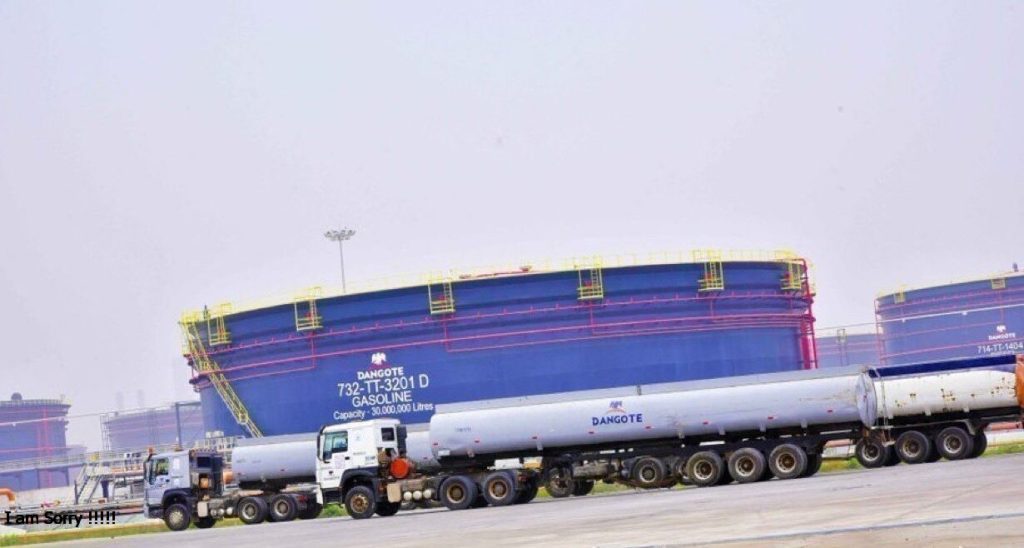Business
Apprehension as Dangote Refinery enforces 45,000-litre cap on fuel trucks

Palpable tension is building in the downstream petroleum sector following Dangote Refinery’s decision to implement a 45,000-litre maximum truck loading limit for Premium Motor Spirit (PMS), Automotive Gas Oil (AGO) and Aviation Turbine Kerosene (ATK) from November 1, 2025.
The move, which aligns with a directive from the Nigerian Midstream and Downstream Petroleum Regulatory Authority (NMDPRA) and other key industry regulators, is designed to enhance road safety by restricting tanker capacity to 45,000 litres before the end of the fourth quarter of 2025.
The NMDPRA had given operators until March 1, 2025, to phase out high-capacity tankers with 60,000 litres and set a new limit of a maximum of 45,000 litres tanker capacity by Q4 2025.
According to the regulatory body, the move is aimed at addressing the alarming frequency of road accidents involving petroleum-laden tankers, which have resulted in catastrophic loss of lives and property.
Dangote Refinery in an advisory formally issued to customers by the Group Commercial Operations Department reads: “In line with the directive from the Nigerian Midstream and Downstream Petroleum Regulatory Authority (NMDPRA), please be informed that the maximum truck loading capacity at the refinery for Premium Motor Spirit (PMS), Automotive Gas Oil (AGO) & Aviation Turbine Kerosene (ATK) is now set at 45,000 litres.
“Kindly ensure all trucks are calibrated to 45,000 litres and have a valid chart to reflect the same.
Executive Director, Distribution Systems, Storage, and Retailing Infrastructure at the NMDPRA, Ogbugo Ukoha, while making the announcement in March said the ban was one of the 10 resolutions reached by the stakeholders’ technical committee on how to tackle the significant increase in crashes that had been observed in relation to trucks and transit incidents and fatalities.
However, speaking to Daily Sun on Sunday, some of the tanker drivers anonymously expressed concern over the directive.
They worried that many of them were likely to be out of work as a larger number of their trucks were above 45,000 capacity. They said some of their principals were not ready to commit so much resources to recalibrate their trucks or buy new ones due to the cost implication.
“We know this is not a new directive by NMDPRA, but the willingness of the truck owners to comply has been slow.
“If that was to be the case, they would have started recalibration in March when this directive was rolled out by NMDPRA. Is it now that they have just a few days that it will be done”?
They also lamented that the development may in the short to medium term lead to petroleum product shortages as fewer numbers of tankers with the approved capacity limit would be the only ones in operation.
They, however, urged both the NMDPRA and Dangote Refinery to consider an extension to allow truck owners more time to fully comply.
However, the President of the National Association of Road Transport Owners (NARTO) and his counterpart at the Petroleum Retail Outlets Owners Association of Nigeria (PETROAN) drummed support for the policy implementation.
Speaking to Daily Sun, PETROAN President, Mr. Billy Gilly-Harris, said as a member of the technical committee, the implementation has been long overdue. He said it was important that every stakeholder contribute their quota to make Nigeria roads safer for everyone.
“It is only when you are alive that you can make money. I support the Dangote Refinery. We have been given enough time. And if Dangote Refinery is set to begin implementation, we are fully behind him”, he said.
He lamented the negative effect of overloaded tankers, which he said has led to loss of several lives.
On his part, the NARTO President, Mr. Yusuf Othman Lawal, said there is no better time to go ahead with the implementation than now.
When asked on the economic implication of the policy on its members, Lawal said: “Well, for now, we can not say much, but we are watching as the situation unfolds. Even if Dangote have tankers in his fleet that is above 45,000 litres, the company would be forced to recalibrate too.”
Lawal, in an interview with Daily Sun in February, said the decision by the FG would put over N300 billion investments in jeopardy.
Lawal added that it costs an average of N150 million to procure a truck, saying the number of vehicles to be affected with this new directive was in the region of 2,000 trucks.
He added that NARTO members own and control more than 10,000 trucks involved in the haulage of petroleum products across the country.
He lamented that some of its members had sourced funds from the banks to purchase the vehicles and were still servicing the loans as of the time the directive was unveiled.
“As a law abiding association, we have no choice but to comply with the directive of the Federal Government. We are still studying the implication of the directive on our members, and at the appropriate time, we shall make a full pronouncement”, he stated. (The Sun)
-

 News19 hours ago
News19 hours agoCourt Sends Bauchi Finance Commissioner to Kuje Prison Over ₦4.6bn
-

 News20 hours ago
News20 hours agoFamily condemns Obaseki’s cousin’s assault, backs legal action
-

 News19 hours ago
News19 hours agoRivers lawmakers reject Fubara’s N100,000 Christmas bonus
-

 Politics19 hours ago
Politics19 hours ago2027: ‘Call Me Stupid, I’m Still Running for Presidency’ – Obi Reacts to Insults
-

 Business20 hours ago
Business20 hours agoBurna Boy’s ‘I Told Them’ is highest-grossing tour by African artiste with $30.5m – Report
-

 News19 hours ago
News19 hours agoFatal crash: Family demands access to Joshua, FRSC awaits probe report
-

 News19 hours ago
News19 hours agoAPC Chieftain Demands Tinubu’s Impeachment Over Tax Bill Scandal
-

 Business20 hours ago
Business20 hours agoWPG sells 60% stake in EKEDC to Transgrid Enerco for N360bn


















